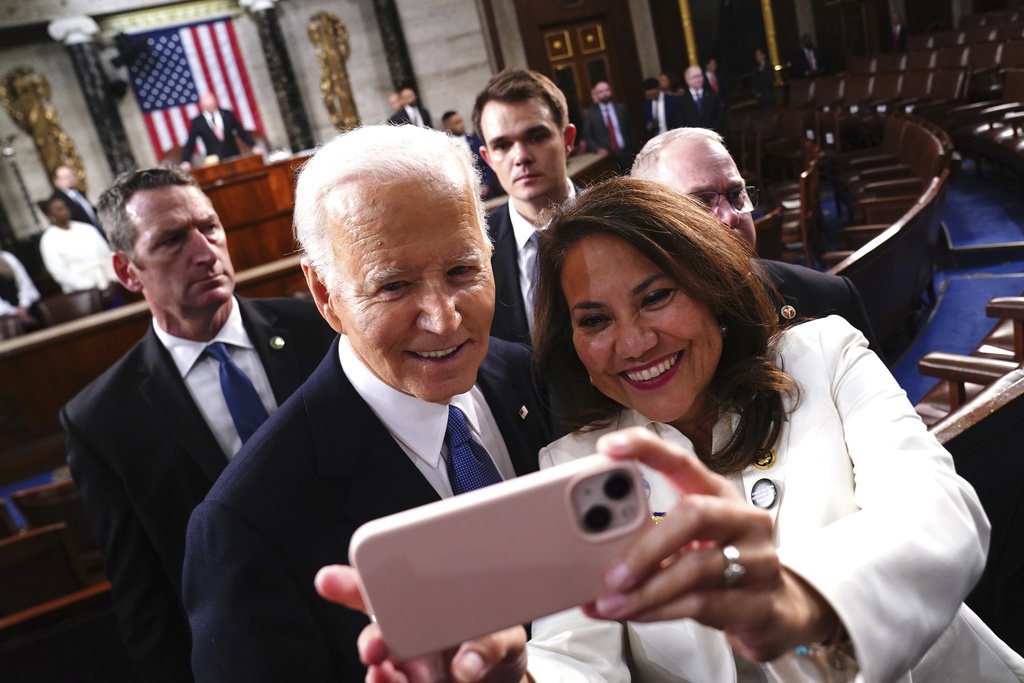
President Joe Biden’s State of the Union appeared to appease the Democratic political chattering class, members of which have expressed concern about his age and mental acuity before November’s general election.
But his address has not resonated in public polls, at least not yet.
In the week since Biden’s State of the Union, his last before his election against former President Donald Trump amid speculation the pair may not take part in any debates, Biden’s average approval-disapproval rating has remained roughly the same, 38%-56%, according to FiveThirtyEight. Another polling aggregator, RealClearPolitics, did find his approval increased during the same time period, but by less than a percentage point to 40%, while his disapproval decreased by the same percentage change to 55%.
Historically, State of the Union addresses have not shifted public opinion much, but Biden’s 2024 speech was different since it marked the start of the general election and came at a crucial moment for his presidency with the Democratic criticism.
To that end, the 2024 general election will be a base election, according to Marist Institute for Public Opinion director Lee Miringoff.
“So not looking at undecided voters and which way they break, as much as the enthusiasm both for and against a candidate,” Miringoff told the Washington Examiner. “For Biden, his support had largely been more anti-Trump than positive towards him. What he did [during the State of the Union] was he addressed some of the ongoing concerns his base has about him as to whether he is up for it. And that was the issue he did well on, that he provided comfort and confidence to his base.”

Although Democratic election turnout has been strong, mostly because of the Supreme Court‘s anti-abortion Dobbs v. Jackson Women’s Health Organization decision in 2022, the Biden campaign has to play the “cards” it has been dealt and stop 2024 becoming a “referendum” on his presidency, according to Miringoff.
“Biden is fortunate in that this is, to some degree, a rematch of two incumbents and so it should be easier to make it a choice in the end and move away from a referendum,” he said. “If there’s any group that will be moving in any direction, it’s the people who dislike both of them and may just have to choose one or the other.”
In an endeavor to reach those voters after his State of the Union address, Biden has traveled to the battleground states of Georgia, Michigan, Pennsylvania, and Wisconsin, with Vice President Kamala Harris and other Cabinet members heading to other swing states, including Arizona and Nevada.
In Michigan, Wayne University politics associate professor Jeffrey Grynaviski underscored that “most people” did not “pay a whole lot of attention” to Biden’s State of the Union address, though 32.3 million viewers did tune in to watch it, according to Nielsen.
“In the limited conversations I’ve had about the State of the Union address, people were like, ‘It was kind of boring, but they’re always boring, and Biden has a pulse,’” Grynaviski said. “To a certain extent, Biden’s strategy going into this speech was to demonstrate that he wasn’t just an old man withering away in the White House, but he still has some fight to him.”
In neighboring Wisconsin, University of Wisconsin-Madison Elections Research Center director Barry Burden emphasized how Biden’s approval rating has been “mired in a narrow range of just a couple of percentage points for the past two years.”
“In the speech Biden revealed how he plays to reframe a major liability — concerns about his age — into an asset by focusing on his experience and steady leadership,” Burden said. “Those themes were helpful to his campaign in 2020 as people tired of the chaos of the Trump years.”
“The president’s messaging around ‘Bidenomics‘ has yet to win over many skeptics, but that might turn in his favor if the economy continues to improve over the course of the campaign,” he added. “His campaign team still has much work to do to sell the electorate on his accomplishments, such as lowering drug prices, forgiving student debt, and investing in environmental efforts.”
Grynaviski had similar advice about Michigan, though he described Biden’s post-State of the Union trip to Saginaw, a county that has supported the winner of the past four presidential elections, as “a big deal.”
“I’m biased because I’m a professor, but the group that turned out for him in large numbers in 2020 was young people, and I think they’re kind of disillusioned,” Grynaviski said. “I’ve been teaching here long enough that there’s kind of echoes of 2016 where I think [Hillary] Clinton took for granted the idea that Bernie Sanders and his supporters among young people would kind of return to the party fold and a lot of them, they didn’t defect to Trump, they just stayed home.”
Meanwhile, for Republican National Committee spokeswoman Anna Kelly, Biden’s approval is near its lowest average point because “everyone knows that the State of the Union is a disaster.”
“Historic inflation, violent crime, and deadly fentanyl are crushing families across the country, no matter how Biden spins it — but he’ll be held accountable when voters cast their ballots for President Trump on Nov. 5,” Kelly said.
A 2020 Biden campaign aide responded: “Polls are slot machines for rich dilettantes. Joe Biden keeps winning elections.”
CLICK HERE TO READ MORE FROM THE WASHINGTON EXAMINER
Meanwhile, Marquette Law School Poll director Charles Franklin, who is also in Wisconsin, cited YouGov and Morning Consult’s favorability-unfavorability polling as the only “apples-to-apples” pre- and post-State of the Union comparison. YouGov had Biden’s favorability rating at 43%-55% on March 5 and 45%-53% on March 12, and Morning Consult had it at 45%-53% on March 4 and 45%-52% on March 11.
“So in the two polls from the same pollsters pre- and post- there is a very small improvement in net favorably by 1 to 4 points,” Franklin said. “But it is just two polls, so I think we wait a month and see if there was any persistent improvement over the month. That would show some real movement rather than an overnight blip. Or no movement. But attributing everything to the [State of the Union] is probably a mistake no matter what.”







